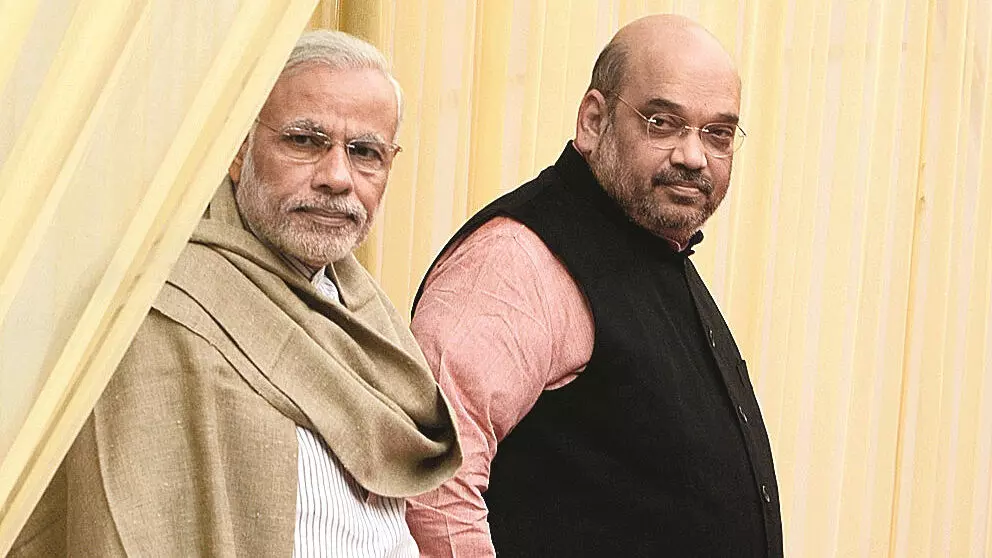
Citizenship law through the backdoor
text_fieldsThe agitation launched by a few student organisations under the banner of 'United Against Hate' in December 2019 in front of the Jantar Mantar later developed into a mass movement against the Citizenship Amendment Act. The mass protests against anti-humanitarian laws such as the CAA and NRC that aim to divide the country in the name of religion were the most significant mass movement against the Modi government and Hindutva. Anti-CAA protest sites, which embraced the diversity of the country in all its beauty and originality, literally embraced the great slogan of 'unity in diversity' in many ways. That is why all state attempts to overthrow the struggles collapsed one by one. When lathis and guns were wielded to suppress the protests, every day new 'shaheen baghs' were being formed in every nook and corner of the country. Attempts by Hindutva to unleash genocide in northeast Delhi and quell the agitation also failed miserably in the face of the sacrifices and willpower of the agitators. Even then, the central government reiterated that it will still enforce the citizenship law. Both Covid and subsequent lockdown have been a stumbling block to further action. Now, with a slight respite from Covid, the Center is preparing to re-enact the Citizenship Act. The Modi government is preparing for new citizenship schemes by taking a detour, fearing that direct implementation will provoke as much protest as in the past.
The Sangh Parivar government is opening the back door to citizenship law through two schemes. One of them is the 60-point action plan that the Center intends to implement by co-ordinating various ministries. On September 18, the Prime Minister had a meeting with the secretaries of the ministries. One of the proposals that emerged from those discussions was related to the implementation of the Citizenship Act. Experts have informed Modi that a birth certificate can be used as a criterion for citizenship. In this day and age of technology, it is easy to link birth certificates to citizenship. Hence, the Prime Minister has directed that the issue be taken forward. The Central Government is also preparing to amend the law to bring birth and death registrations, which have been handled by states for the last 52 years, under the control of the Center. Currently, birth and death registration is done by the local registrar appointed by states. According to the Amendment proposed by the Center, they should be integrated at the national level after the data collection conducted by the State. Or, with the passage of the Amendment, the Registrar General of India will be the custodian of all the information. The Amendment also seeks to update the NPR (National Population Register) required to prepare the NRC.
While the government argues that the plans are to avoid technical glitches related to the collection of information about the citizens of the country, it can only be viewed with scepticism and a little apprehension for the time being. There are huge pitfalls lurking in both projects. The fact that the birth certificate is considered the criterion for citizenship is the greatest indication of discrimination and expulsion.
Getting a birth certificate in a country like India is not an easy task. According to the 2016 National Family Health Survey, 38 per cent of children under the age of five in the country do not have a birth certificate, meaning that the birth of these children is not recorded anywhere. According to a 2019 UNICEF report, India is one of the top five countries in the world with the highest number of unregistered children. By law, a baby must be registered with the Civil Registration System (CRS) within 21 days of birth. The fact is that many people are ignorant of such a system in view of the realities of rural India. In Assam, despite the birth certificate criteria for the NRC, about 40 lakh people were dropped out for the same reason. The registration has been in place since 1969. Those born before then are also alive now. In this case, the consequences of converting the birth certificate into a citizenship certificate can only be imagined when the NRC is implemented nationwide. In other words, a conspiracy is being hatched to recruit citizens and turn them into refugees on the basis of a purely impractical and unscientific criterion. There is no doubt that things will only get worse as the control of birth and death registration comes under the control of the Central Government. Beyond that, it is also a well thought out plan to encroach on state power. One must, indeed, resist this move.























